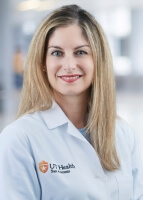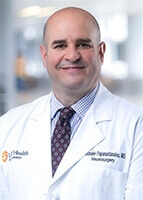Doctors at The University of Texas Health Science Center at San Antonio (UT Health San Antonio) are among the nation’s first to implant a newly approved sensing rechargeable deep brain stimulation device with a 15-year battery life allowing more continual treatment of patients with movement disorders.
Deep brain stimulation, known as DBS, is the placement of electrodes in the brain connected to a battery-operated generator in the chest similar to a cardiac pacemaker. A small impulse of electricity moves from the generator to the electrodes to stimulate a specific area of the brain, relieving some symptoms and side effects for those with Parkinson’s disease, dystonia, epilepsy and essential tremor conditions.
The key feature of the new neurostimulator device is its longevity, a significant improvement over previous non-rechargeable devices that required replacement every three to four years.

“This extended lifespan means that patients will need fewer battery replacement procedures, which in turn reduces their risk of developing complications associated with these procedures,” said Eleni Okeanis Vaou, MD, associate professor and chief of the movement disorders division in the Department of Neurology, Joe R. and Teresa Lozano Long School of Medicine, at UT Health San Antonio. She also is a neurologist and movement specialist at University Health.
“Moreover, the new technology incorporated into the rechargeable device allows us to sense and record patients’ symptoms for longer,” said Vaou, who also is affiliated with the school’s Glenn Biggs Institute for Alzheimer’s and Neurodegenerative Diseases and sees patients with sleep and neurodegenerative disorders. “This provides us with valuable data that can be used to further customize and refine treatment plans.”
FDA approval and after
The U.S. Food and Drug Administration approved the device on Jan. 8. Just more than a week later, on Jan. 18, Vaou joined Alexander Papanastassiou, MD, associate professor of neurosurgery in the Long School of Medicine and a neurosurgeon at University Health who implanted the device in a 38-year-old patient with dystonia at University Hospital. Dystonia is marked by painful, prolonged muscle contractions that result in abnormal movements and postures.
Five days after the surgery, Vaou saw the patient at her clinic and activated the device to begin programming and managing symptoms. The patient experienced immediate relief of symptoms of about 50%, said Vaou, who will continue to monitor progress over the next several weeks.
She has likened the advancements in DBS devices to smartphones that keep upgrading. She can steer stimulation to the patient’s brain precisely and collect information for a personalized, focused therapy.

When the patient comes in, Vaou can analyze their recordings over days and weeks, and have an electronic diary of their movement symptoms. And with that information, the doctor can better understand the symptoms and adjust therapy settings.
Importantly with this new device, the patient won’t need to have surgery again to have it replaced for another 15 years. Vaou said she’s seen cases in which a battery will start dying and symptoms worsen, with patients ending up in the hospital because they didn’t replace the battery earlier.
“There are a lot of complications if you don’t catch it in time, and you have to get another surgery to replace it,” she said. “And patients may not want to go in and replace a battery every three or four years.”
A center for neuromodulation
She said the DBS program at UT Health San Antonio continues to make significant strides in the field of neuromodulation, and that its therapies are witnessing a steady increase in demand.
“This growing need underscores the significance of our work and the impact we can make on our patients’ quality of life,” Vaou said. “Looking ahead, we are enthusiastic about the potential growth opportunities in our center. We anticipate becoming a prominent center for neuromodulation in Texas, offering cutting-edge treatments to an increasing number of patients.”
The center already is designated a Parkinson’s Foundation Comprehensive Care Center, the first of its kind in Texas, recognizing centers providing excellent care to people with Parkinson’s disease within a broad geographic region.
Vaou is guest speaker at the “Parkinson’s Disease Clinical Reception: San Antonio,” hosted by the Parkinson’s Foundation on Feb. 29, 6-8 p.m., at the Blü Prime Steakhouse in San Antonio, 1818 N. Loop 1604 W, Suite 101.
She said the event is designed for all providers who treat patients with Parkinson’s disease, with the objective of an educational conversation with general neurologists, primary care physicians and advanced practice providers.
“The lack of movement disorder specialists is a significant issue in our health care system, particularly in Texas and, more specifically, in San Antonio,” Vaou said. “To address this issue, it is crucial that we invest in ongoing education for our providers to enhance their understanding of Parkinson’s disease and the advancements in its care.
“This will not only improve the quality of care for our Parkinson’s disease population but also help to alleviate some of the strain on our already limited number of movement disorder specialists,” she said.
For more information on the Parkinson’s Foundation reception, contact Maddison Watkins, Parkinson’s Foundation, at mwatkins@parkinson.org, 913-416-4116.
Note: Neither UT Health San Antonio nor University Health endorses commercial products or services by name.


